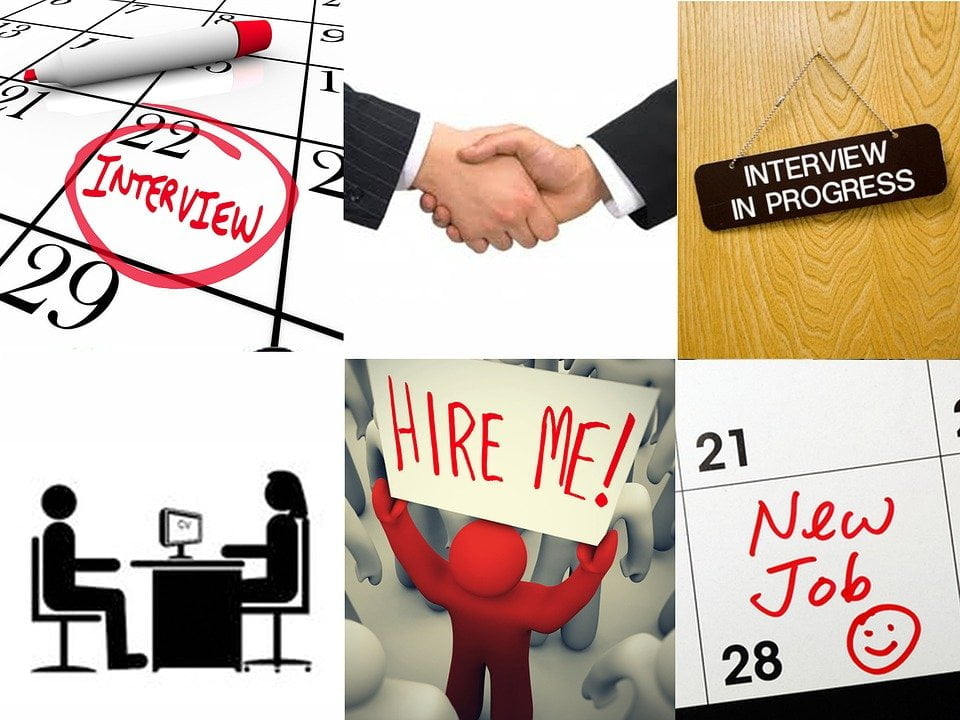The Complete List of Sales Interview Questions and Answers
Have you ever “Nailed it!” when interviewing for a sales position? All the stars aligned. Your answers were spot on, and the rapport was effortless. Isn’t that the best feeling?! How do you usually feel when interviewing for a sales position?
Excited? Nervous? Confident? Uncertain? Driven? All of the above?
Regardless, there are concrete ways that you can raise the bar on your interviewing skills by becoming aware of the questions you will be asked, and some effective ways to answer them.
Below are a wide variety of interview questions ranging from basic to advanced, and high potential answers based on my 15 years of experience being a professional sales recruiter, and sales employment agency owner. During that time, I interviewed over 6,000 sales candidates and placed close to 1,000 in sales positions. (Click here for additional information on how to become a most place-able applicant. Read below for the Q&A.)
The purpose in sharing this information with you is for you to make it your own by focusing on the questions and answers that will be of most use to you. Feel free to make any changes to the questions and answers to best suit your interviewing style and scenarios. Most importantly, there is no ‘one right answer’ to the majority of interview questions you will be asked. Chemistry and gut instincts are beyond our control. So, control the controllables by using the following interview questions and answers to give you insights into the sales interview process, and increase your chances for greater success in getting the career opportunity offers you want.
Interview Q & A
- Tell me a little bit about yourself.
Danger! Don’t go on, and on….and on about yourself. Stick to the core information, the relevancy of who you are, and the position you are after.
For instance, you can say, “I’m from a family of driven entrepreneurs who taught me to go after what I want, and to never give up. In college, I worked to minimize student loans, and studied business because I’m fascinated by it. (Or, liberal arts, to get a well-rounded background. Or, theater because I love acting. Or political science, because of the strategy involved in politics.”) You can add sports by saying, “I am an avid runner and competitive water skier”, etc. Mention any sales/sales management success you have had. Again, be brief, genuine, speak your truth, make it interesting, be present and passionate.
Highlight your work experience with specifics. Examples: “I am great at new business development. I tripled the client base in my territory in the first year, yielding revenue gains of over $1.2 million.” OR, “I won the top sales incentive trip the last three years.” OR, “As a manager, I am really good at developing people. I doubled the number of sales reps on my team and led them to revenue growth of over 75% last year.” OR, “I’m excellent at relationship building and leveraging sales. One example is when I… “ OR, “I am very good at going after new business. For example…” OR, “I love a challenge, like when….” Give examples to give substance to who you are and why they should hire you.
2. Can you tell me more about your sales experience? “Sure.” Keep it positive but realistic. Site what you have specifically done to get sales, such as, turn a no into a yes, made the choices you did regarding the companies you worked for.
3. Why do you want (did you choose) a sales career? “I want/chose a sales career because sales is one of the few professions where your hard work, strategic thinking, thorough preparation and perpetual action, literally pay off. It’s fun and at times frustrating, challenging, lucrative and rewarding work.”
4. What is your best memory of a sale you won? “The best memory of a sale I won was when I was able to win the sale against all odds. (Hint: Prospective employers want “resilient go-getters”.) A brief story is a good way to go. Here is a sample: “Each meeting was getting closer to the commitment and then, (Mention a few specific obstacles you overcame here.) the client had to take a medical leave of absence, his replacement was hard to reach, it seemed like priorities were shifting and the sale was slipping away. I realized I had to get more strategic in my approach so I suggested… The hard-won sales are the most rewarding to me.” This example shows that you are excited by the challenge of a sale, and winning the business. It shows your tenacity, as opposed to highlighting the easy sale that actually, isn’t considered “real sales” by most. It’s considered order-taking.
5. What was a mistake you made? What did you learn from it? “A mistake I made was talking too much. I learned to ask questions to understand more of the thought process of the customer, and learned the importance of when to stop talking.” (By stopping talking after this brief answer – it proves you learned how to stop talking!) This answer is also good for the dreaded question, “What are your weaknesses?” You can say that listening is something you feel can always be improved. For more advice on how to “stop talking” click here: http://www.youtube.com/watch?v=nh54xKUVgwg
How about a multiple-choice question like my friend Dustin asks? He is a sales manager in telecommunications. Here is his question:
6. Put the following three words in order of importance to you. He goes on to say, “There is no right answer.”
Money, Recognition, Promotion
Promotion, Recognition, Money
Recognition, Money, Promotion, etc.
7. What order would you put these three words in to be successful and why?
I personally said my answer to that question would be Money, Recognition, Promotion, because if I make the company, my clients and myself a lot of money, the recognition and promotion will follow in that order. Although, Dustin said there is no right answer to the question, his thinking is that if you get recognition, it will motivate you to work hard and get a promotion, and the money will follow. With a question like this, as long as you have a logical answer, and sincerely mean it, you should be fine.
8. What do you do to regroup and recover when you have a bad day? One sales VP told me that a candidate he ended up hiring said that when she had a tough day she would go for a long, fast ride on her horse, and leave it all behind. Of course, you could say you go to the gym, since most of us don’t have a horse! A trickier question along this line is when asked, “Describe an example of bad day, and how you dealt with it.” It’s trickier because it is more revealing as to what your perception of a bad day is. You can always say you don’t dwell on the bad days. You determine what you can learn from them and move on.
9. How do you motivate yourself? Being goal-oriented, money-motivated, self-managed, self-determined, and passionate about sales are all good answers. Many sales leaders have told me they like a person who has a lot of financial responsibility. One answer a sales VP said he liked was when a candidate said, “My mortgage motivates me.”
10. What type of work environment do you like most, to do your best work? Keep in mind the work environment you are applying for first. Are you OK being in close quarters on the phone tele-selling, or are you best independent, and love field sales work? You may want to be proactive and ask the interviewer to describe the type of work environment of the position, as well as the team and his/her management style, so you can answer the question more effectively.
11. Describe your favorite boss and what made them your favorite?
Caution! Be careful with this one. You can still be honest and careful like this:
“My favorite boss and I had a great relationship. I didn’t like to be micromanaged, so initially I said, ‘If you leave me alone, I will make you money.’ I had a lot of experience, and a proven track record. He agreed. But I realized that I was being more of a maverick than a team player and after a while, we adjusted that expectation. He felt the team could learn from me and I agreed. We both thought I could learn from them, even though I was in major accounts. So, the work relationship evolved in a different and even better way.”
12. Have you ever had a manager you didn’t like? Why?
This is another tricky and revealing question. If you had a manager from Hell, you can say so, as long as you speak factually, and not negatively, about the person. Separate the person from their behaviors. A disorganized, negative and indecisive manager makes sense to be awful! Don’t mention personal digs, like he/she was annoying, lazy, impossible, a drunk, flirtatious, because these words are judgmental, less factual and more emotional, and can sound like you are bashing the manager and thus can backfire. The “why” to that question becomes obvious, but you can say, “The morale of the department started to decline and inevitable turnover happened, so it was time to go.”
13. When did you first know sales was for you?
What they are looking for here is if you have an innate interest in sales. A story (always true) is good here. Whether you had a lemonade stand, worked in your mom’s retail store, started a company in your garage, or applied to be on Shark Tank, like my daughter’s friend, who at the age of 12 got Barbara Corcoran to be his business partner, a short story works well here. Or maybe sales came to you later in life by studying it in college, or selling t-shirts for your fraternity, or when you stumbled upon a blog about sales.
14. Did you finance any of your college tuition? I’ve heard some sales managers ask this, mostly of fresh grads, to see if they have had to work for something vs. getting a free ride. It’s a simple yes or no question. Some say they worked summers or part time, if they didn’t have to pay for college. It’s not a deal breaker.
15. What are you most proud of?
This question lets the interviewer know what you value about your past experiences. It’s an opportunity to speak about accomplishments. Practice answering this in a brief and meaningful way before the interview, so that you give an answer that is meaningful. Examples: “I most value my 5 years at XYZ company because it gave me a solid successful sales foundation.” OR, you can make it more personal like this: “I am most proud of helping my brother get through college because our parents couldn’t afford to pay for it, and it completely changed his future for the better.” OR, “I’m most proud of my work on the board of ABC foundation because of the impact we have had on funding life-changing programs.
16. What is the best advice you have ever received? One candidate in an interview for a national advertising sales position said that her father gave her the best advice. He told her “There is always money for a great idea.” Keeping that in mind has made her a lot of money selling advertising campaigns and concepts.
17. What do you do for fun? Say what you do for fun. “I scuba dive, compete in Iron Man races, play the drums in a band at local events, do yoga.”
Again, practice is key. Take a moment right now and answer this question aloud a few times. Collect your thoughts. Say it again, and evaluate. Why would you do this on such a simple question? Do it on all the questions listed in this piece. The first answer, even to the simplest question, can come out disjointed and garbled.
18. How do you balance work and life? “I am pretty good at balancing work and life. I am able to leave the day behind me and shift gears to spend time with friends and family.” OR, “I’m terrible at balancing work and life. Work gets the best of me. I am always thinking of the next step in moving the needle in sales.” OR, “I’m great at balancing work and life, funny thing is, when I’m not working, I still find that I meet people that serendipitously lead to sales opportunities.”
19. What have you done that has beat the odds? Describe a time in your life when things weren’t going well and how you were able to turn it around. For example: “2009 was an awful year. It seemed everyone was in a holding pattern waiting to see what would happen next. The market bottomed out at 6,507.4 in March of that year. Unthinkable!” (You can ask the interviewer: “How did you do during the recession?”) You can continue by saying, “Some did well. My strategy was to keep making calls and meeting people. I knew at some point the tide would have to turn. “Maintain the Campaign” was one of my senior manager’s mottos. It worked! Some panicked. It didn’t seem to help them. Eventually, sales opportunities started to come back again. I don’t get distracted by the external circumstances that can panic most people. I know activity brings sales.”
20. Describe how/if you are a team player. I’m a team player because I think the team can strengthen those on it if they collaborate and commit to helping one another succeed. I also like having the independence to get out of the office and grow my territory.
21. What are three things you would do to build rapport with people?
“First, listening is key. Second, asking questions to get to know them better and so I can really pay attention to and care about what they say. Third, would be making a connection by talking about what interests them, and any insights or experiences I can offer to add value to what they like, need or want.”
21. What is the first thing you would do when sales are down? “When sales are down, I stay highly focused and organized. I create a strategic outreach plan. The plan is focused on consistency and targeted activity numbers. For example: Make 20 phone calls to past and high potential clients. Send 30 emails each day that are directly related to growing new and existing business opportunities, and start going after securing more meetings/appointments.”
22. How do you know you can sell? “Because I have done it successfully. I like how the numbers tell the story, so you always know how you are doing.” OR, “Because I love it! It’s never boring.”
23. Sell me this pen. Has anyone ever asked you to do that? I’ve had candidates who have been asked this question. So, you answer it by doing a needs analysis.
DON’T answer it by going on and on about the features and benefits of the pen and why they should buy it! DO ask, “What kind of pen do you like to write with?” DO ask, “Describe your favorite pen. What does it look like? How does it write, thick, thin, smoothly? What color ink do you prefer? Do you care about the way it looks, or just the way it writes? Where are you going to use it? Out with a client or in the office? What price range/ballpark are you looking to spend? What else do you like about your favorite pen?” Then provide the reasons they will like the pen you are selling/or not like it, depending on the answers to your probing questions. Check in with a question like, “What do you think about this pen?
Would you like to purchase it today? Cash or charge? If no, why not? What would be better suited for you? Is that what you would like to buy instead? OK, I’ll order you one now.” (Remember to close at the end!)
24. How do you handle disappointment? “Learn what I can from it, and move on.”
Short and sweet! If they ask, “That’s it?” Say, “Yes!” I have seen far too many team members waste valuable selling time venting about the, ‘what if’s’ of a sale that didn’t happen, when instead it would have been a better use of their time to get back out there.”
Strange questions:
Every once in a while, during my experience as a professional recruiter, a candidate would tell me that a sales manager, or top executive, asked a strange or blunt question. If you can prepare to expect the outrageously unexpected question, you will have more success. When asked a strange question, take a moment to think, and then answer. Here are a few:
What color best describes you and why? One sales manager said he asked this question because it can’t be rehearsed. For an answer, he liked to hear things like this: “Red, because I am bold.” OR, “Green, because it’s the color of money and I am money-motivated.” OR, “Yellow, because I am very optimistic.” There is no “right” answer to this question. He said he liked to see how candidates think on their feet and justify their answers.
What animal would you say you are most like and why? The answer the candidate gave to this strange question was a cheetah because they are one of the smartest and indisputably the fastest animal in the jungle. He went on to say, he likes to do a quick analysis of a situation and get things done! (Like a cheetah would.) The key here is to play along and not get tense, flustered or feel any pressure to give the perfect answer, because there is none. Just smile and do your best.
Are you prepared for the last interview question? Here it is…
25. Do you have any questions? Yes! You BETTER have a few questions because questioning shows interest. But don’t ask questions for the sake of asking questions. Ask questions on things you are curious about.
Below are a few questions that the candidates who were most successful in getting sales career offers asked. Of course, you don’t have to ask all of them.
Ask the ones you want to know the answers to. FYI: Questions number 1, 5 & 6 on the list are very impressive to prospective employers. The candidates I prepped to answer these questions almost always got the offer.
- Describe your best SDR/AE/Sales Manager/Director/Executive. What characteristics did he/she/they possess that made them so good?
- What kind of leader are you?
- How would someone describe you who works for you?
- What do you expect/value most in the people you manage/lead?
- What would be a few things that someone you work with, or who works for you, has done or could do, that would exceed your expectations?
- What could a person who worked for you do that would “wow” you?
- Do you like working here? How successful have you been here, and what do you attribute that success to?
- What do you/others like most about working here? What could be improved?
- Can you recall a sale you or someone on your team made that was most memorable? What was it and why?
- Can you please describe the interview process, how many applicants are you considering and how do I compare? What is it that you are looking for that will be the determining factor in making an offer?
- (When) Can we set up the next interview?
- What timing works best for you to meet again?
FINAL RECOMMENDATIONS
The 3 Interviewing Essentials:
- Become an MPA
Being a sales recruiter for 15 years, I learned early on that my goal was to find or create MPAs if I wanted to be successful at my straight commission recruiting career. (Net-net I broke all prior sales records and ranked #1 every year out of 98 recruiters.)
An MPA is a Most Place-able Applicant. To be or become an MPA you must do the following:
Be your best, look your best and prepare your best. Then relax, have fun and enjoy the process. You must arrive to interviews early. Practice answering interview questions ahead of time, and follow-up afterwards. Treat every interview like a sales call and the interviewer like a client.
For more information on becoming an MPA, and nailing your next interview, click here: https://www.youtube.com/watch?v=hERSSAvC4yI
- ALWAYS go for the offer!
Make them want you! Because you can always say, “No”
The most heartbreaking part of recruiting was when candidates would go into interviews half-heartedly. Some would go to the interviews to check out the company to see if they liked it, and then realized afterwards that they really wanted it, and of course didn’t get it because they didn’t sell themselves. I even would try to get them back in for a second interview and the managers would say, “This is a sales position. He/she didn’t sell me.” “Shopping” is NOT a good way to go. A better way is to always go for the offer – Yes, every time, by being your best, giving it your all, having enthusiasm, expressing interest, keeping your answers concise and to the point. Make them want you! Until you have an offer you have nothing. Often you will not get the offer on the first interview. But you can close for the next interview. If you decide the next day that it’s not for you, you can cancel the next interview. But at least you have given yourself a fair shot.
- Practice, practice, practice!
It feels foolish at times practicing with a friend or in front of a mirror answering interview questions. But the payoff is huge. You will interview better. Some worry that if they practice writing down interview answers, or saying them prior to the interview that they may sound canned. I call it being “planned not canned”. Once you are prepared, you earn the right to be spontaneous. Winging it is for the birds!
Joy Baldridge’s 3 rules for sales and interviewing success:
- Those who prepare most win – prepare and practice interview questions before the interview.
- Those who ask the questions have the power! – Prepare and practice asking questions during the interview process
- People are persuaded by their own words – Practice and prepare to listen to the words that the interviewer uses to align with them the conversation.
Mindset is key to successful interviewing. Click below to learn how to stay in the “House of Glad” by watching Mindset videos Part One and Three.
https://www.youtube.com/watch?v=H069f9YsLtk
| Joy Baldridge Mindset Part 1 Joy Baldridge helps the best become better at increasing revenue and productivity while decreasing frustration and stress. |
https://www.youtube.com/watch?v=lq6UpXNszEY
| Joy Baldridge Mindset Part 3 Introduction to the House of Glad. Joy Baldridge helps the best become better at increasing revenue and productivity while decreasing frustration and stress. |
The Evolution of Interviewing for a Sales Position:
Interviewing for a sales position is everchanging. One sales professional recently asked me for tips on doing a Skype interview successfully. My suggestion was to look at the camera instead of the screen. One sales manager advised to do it in a quiet, private place with no distractions in the background. He said he had a Skype interview with one candidate and he could see and hear cars moving. Using common sense is a good thing! Of course, researching the company and person you are interviewing with is essential. But don’t assume anything from what you read. Ask questions to clarify instead of spewing facts to build rapport. Always know why you are interviewing for the job. They will probably ask why us and why you?
Now that you have just read this comprehensive list of interview questions and answers that will help you and everyone one you know become better at the interview process, please post any interview questions and/or answers that you would like to share or have questions about. Stories about awesome and awful interview experiences are also appreciated. Happy Interviewing!
P.S. My mother used to always say, “Without sales you have nothing! To test that theory, I recently asked my friend Ann, who has a very impressive financial background and is a very successful comptroller for one of the big broadcast networks in New York City, what career advice would you give a recent graduate, or someone transitioning in their career?
Her answer: “Go into sales!”
Why?
Her answer: “Because sales is where all the money is.”
Happy Selling!
MEET JOY BALDRIDGE
Joy Baldridge, CPC, CSP, is the founder and president of Baldridge Seminars International, and a world-renowned sales expert who had her first speaking engagement at The White House at the age of 19. She got there by cold calling the president. Joy works with the best companies in the world with the sole goal to make the best even better at increasing sales, productivity and profitability, while decreasing frustration and stress. Joy is a dynamic and innovative general session keynote speaker at national sales meetings, conventions and association conferences both domestically and globally. She is also an author and custom-designs and delivers engaging and entertaining sales training programs that get results. For more information on Joy go to www.joybaldridge.com or call/text 203-564-0141. For more Facebook Live Streams visit http://www.facebook.com/JoyBaldridgeCSP To book Joy for powerful and uplifting keynote presentations, sales training or retreat facilitation email: joy@joybaldridge.com







